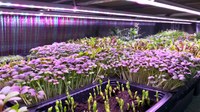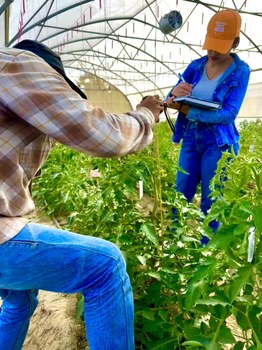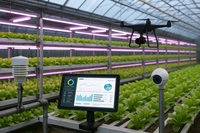We are looking for a Master’s degree student for an experimental thesis in the field of vertical farming, with a particular focus on the cultivation of plants for pharmaceutical and cosmetic purposes.
Period:
For further information, please contact:
Andrea D'Aprile - andrea.daprile3@unibo.it

Plants represent a valuable repository of phytochemical compounds, many of which exhibit bioactive properties utilized in diverse industries such as pharmaceuticals and cosmetics. Given the considerable interest in exploiting these botanical resources for pharmaceutical and cosmetic purposes, there is a burgeoning research interest in optimizing their cultivation within controlled environments.
Indoor cultivation systems offer a controlled environment shielded from external meteorological fluctuations. Through precise environmental control, continuous monitoring, and microclimate regulation, these systems facilitate the attainment of higher and more consistent yields across seasons.
The thesis will focus on advancing the state of the art regarding innovative species that can be cultivated indoors, analyzing their various cultivation requirements as well as their potential applications and uses.
THESIS DURATION: To be arranged within a timeframe spanning from May to October
CONTACT: Teresa Piovano (teresa.piovano2@unibo.it)

The National University of Piura, Peru, offers research opportunities for students interested in sustainable and precision agriculture, with a focus on climate change adaptation in arid environments. The CECASP offers a unique environment for research and is equipped with experimental fields with drip irrigation, a hydroponic greenhouse with NFT panels for soiless production, greenhouses for seedling propagation and soil-based vegetable production. A new greenhouse for simplified hydroponic systems isunder construction.
The research topic will be agreed upon between the student and his/her academic advisors within the project, ensuring alignment with CECASP objectives and the student's interests.
THESIS DURATION: minimum 6 months, with flexibility depending on the research involved.
STARTING DATE: to be agreed upon, depending on the availability of the candidate and the needs of the project
SKILLS REQUIRED: Basic knowledge in agronomy, environmental science or related fields. Ability to work in a team and adapt to rural environments. Good communication skills, proactive mindset and problem solving skills.
BENEFIT: The candidate will have the opportunity to develop hands-on experience in sustainable and precision agriculture in arid climates, as well as the opportunity to contribute to climate change adaptation efforts in rural communities. There will also be the possibility of accommodation provided on-site and meals may be available upon agreement.
USEFUL INFORMATION: Piura is an accessible city, Monthly Expenses may vary depending on lifestyle, on average: €90 to €225 for housing (if not provided by the program); €90 to €135 for food (varies depending on meals provided); €18 to €45 for transportation.
CONTACTS: To apply or request more information, contact ulopezg@unp.edu.pe or ivan.paucekpagan2@unibo.it, enclosing your CV and a letter of motivation.
Facebook: https://www.facebook.com/share/15c5v1rcGK/?mibextid=wwXIfr

TITLE: Artificial Intelligence in Agriculture: Mapping Applications and Future Perspectives
This thesis proposes a bibliographic investigation and critical analysis of the main applications of artificial intelligence (AI) techniques in agriculture, with particular reference to the horticultural sector. The aim is to understand which methodologies and tools have already been used (computer vision, predictive models, agricultural robotics, input optimization) and to identify the main areas for future development.
The thesis activity involves the collection and analysis of scientific literature on the application of AI techniques in agriculture. The results will be systematically organized to create a structured overview of the main areas of application, highlighting established knowledge, existing gaps, and potential directions for future development.
At the end of the project, the student will have acquired the following skills:
A comprehensive overview of AI applications across different agricultural sectors, with a focus on horticultural crops.
Skills in researching and analyzing scientific articles and research projects.
The ability to critically evaluate the strengths and limitations of various AI technologies applied to agriculture.
Basic knowledge of agricultural data analysis tools and commonly used AI model architectures in the sector.
THESIS DURATION: To be agreed
CONTACT: Matteo Landolfo (matteo.landolfo6@unibo.it)